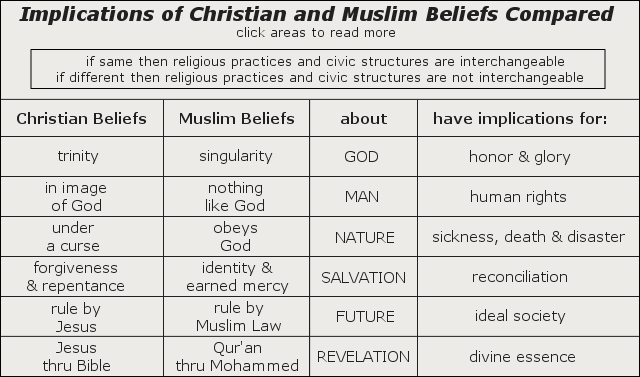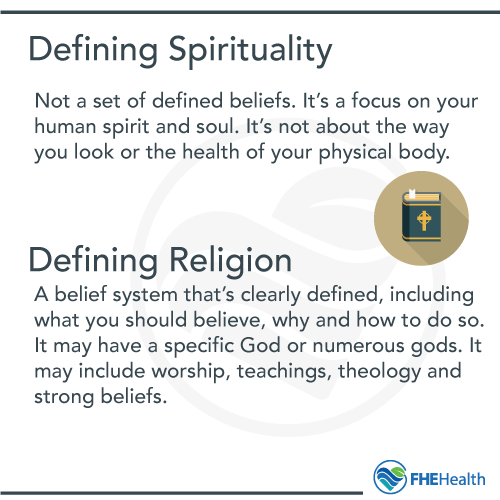
In a world as diverse as ours, navigating differences in religious beliefs can sometimes be a challenging task. With a multitude of faiths and belief systems coexisting, it becomes essential to foster understanding, empathy, and respect towards one another’s religious beliefs. By embracing a spirit of open-mindedness and engaging in meaningful dialogue, we can create a harmonious and inclusive society that values diversity and promotes mutual acceptance. It is through this navigation of differences in religious beliefs that we can build bridges and foster a world where everyone feels valued and understood.

This image is property of globalnews.ca.
Understanding Religious Pluralism
Religious pluralism is defined as the acceptance and recognition of diverse religious beliefs and practices within a society. It acknowledges that there are multiple paths to spirituality and that no one religion holds a monopoly on truth. Understanding religious pluralism is crucial in today’s increasingly globalized and diverse world, as it promotes peace, respect, and acceptance among individuals and communities with varying religious backgrounds. By exploring and appreciating the richness of different faith traditions, we can foster a more inclusive and harmonious society that celebrates our shared humanity.
Importance of Understanding Religious Pluralism
Understanding religious pluralism is of utmost importance for several reasons. Firstly, it promotes a culture of respect and tolerance towards individuals who hold different beliefs from our own. In a pluralistic society, diverse religious perspectives are valued and celebrated, fostering a sense of inclusivity and unity despite our differences. Secondly, understanding religious pluralism enables us to engage in effective and meaningful interfaith dialogue. By listening to and learning from different religious traditions, we can deepen our understanding of our own faith and cultivate a greater appreciation for the diversity of human experiences. Lastly, understanding religious pluralism is crucial for combating prejudice and discrimination based on religion. By challenging stereotypes and promoting education, we can foster a more compassionate and empathetic society that embraces religious diversity.
Fostering Respect and Tolerance
Recognizing Diverse Beliefs
To foster respect and tolerance, it is essential to recognize and acknowledge the diverse beliefs held by individuals and communities. This involves acknowledging that there are many paths to spirituality and that each person’s beliefs are valid and worthy of respect. By striving to understand the core tenets and practices of different religions, we can cultivate a mindset of acceptance and appreciation for the diverse religious landscape around us.
Respecting Individual Autonomy
Respecting individual autonomy is another crucial aspect of fostering respect and tolerance. Each person has the right to choose their spiritual path, and it is essential to respect their choices, even if they differ from our own beliefs. By recognizing and affirming the agency of individuals, we create an atmosphere of mutual respect and understanding, where individuals feel safe to openly express their religious beliefs without fear of judgment or ridicule.
Promoting Open-Mindedness
Open-mindedness is key to fostering respect and tolerance in matters of religion. It is important to approach conversations and interactions with individuals from different religious backgrounds without preconceived notions or biases. By cultivating an open mind, we can actively engage with diverse perspectives, challenge our own assumptions, and cultivate a greater sense of empathy and understanding.
Effective Communication Strategies
Active Listening
Active listening plays a crucial role in promoting understanding and respect in interfaith dialogues. By giving our full attention to the speaker, asking clarifying questions, and showing genuine interest in their perspective, we demonstrate that we value their beliefs and experiences. Active listening allows us to establish meaningful connections and develop a deeper understanding of the nuances within different faith traditions.
Avoiding Judgment and Stereotypes
To foster effective communication, it is essential to avoid making hasty judgments or relying on stereotypes about individuals’ religious beliefs. Stereotyping can perpetuate misconceptions and hinder meaningful dialogue. Instead, approaching conversations with an open mind and a willingness to learn allows us to engage in constructive and respectful discussions that lead to increased understanding and harmony.
Empathy and Compassion
Empathy and compassion are integral to effective communication across religious differences. By putting ourselves in the shoes of others, we can gain insight into their experiences, challenges, and joys. By striving to understand how religion shapes someone’s identity and worldview, we can develop a deeper appreciation for their perspective. Compassion allows us to connect on a human level, fostering relationships built on understanding and acceptance.

This image is property of www.aconsciousrethink.com.
Building Common Ground
Identifying Shared Values
Building common ground among individuals from diverse religious backgrounds can be achieved by identifying shared values. Despite theological differences, many religions promote principles such as compassion, love, justice, and humility. Recognizing and focusing on these commonalities can help bridge religious divides and promote understanding and collaboration among individuals and communities.
Finding Common Goals
Another way to build common ground is by identifying and working towards shared goals that transcend religious differences. Issues such as poverty alleviation, environmental sustainability, and social justice are concerns that can unite people of different faith traditions. By coming together to address these shared challenges, individuals from diverse religious backgrounds can find common purpose and work collaboratively towards a better world.
Promoting Interfaith Dialogue
Interfaith dialogue provides a platform for individuals from different religious backgrounds to engage in open and respectful conversations. By actively participating in interfaith dialogues, we create opportunities for individuals to learn from one another, challenge misconceptions, and foster mutual respect and understanding. Interfaith dialogue promotes the idea that diverse religious beliefs can coexist harmoniously and helps build bridges between communities.
Handling Disagreements and Conflicts
Resolving Conflicts Peacefully
Disagreements and conflicts are inevitable, even in matters of religion. However, it is crucial to approach these conflicts with a commitment to peaceful resolution. Seeking common ground, utilizing peaceful negotiation techniques, and employing empathy and understanding can help resolve conflicts peacefully while preserving relationships and promoting harmony.
Seeking Mediation or Counseling
In more complex conflicts, seeking mediation or counseling can be beneficial. Trained mediators can facilitate dialogue and help parties find mutually agreeable solutions, ensuring that conflicts are addressed in a fair and respectful manner. Additionally, seeking counseling or guidance from religious leaders or professionals trained in conflict resolution can provide individuals with the tools and support necessary for navigating and resolving religious conflicts.
Promoting Dialogue over Confrontation
Instead of resorting to confrontation, promoting dialogue as the primary mode of communication is vital in handling disagreements. Dialogue creates opportunities for individuals to express their perspectives, ask questions, and learn from one another. By fostering a culture of open and respectful dialogue, we can transform conflicts into opportunities for growth, understanding, and ultimately, resolution.

This image is property of www.oprev.org.
Educating Ourselves and Others
Studying World Religions
To foster a more comprehensive understanding of religious pluralism, educating ourselves about the various world religions is crucial. By studying the core beliefs, practices, and histories of different faith traditions, we can develop a broader perspective and a deeper appreciation for the diverse ways in which individuals seek meaning and purpose in their lives.
Being Open to Learning
Being open to learning is fundamental in cultivating understanding and promoting religious pluralism. By recognizing that our own understanding of religion may be limited and incomplete, we can approach conversations and educational opportunities with humility and a genuine desire to learn from others. Embracing continuous learning allows us to expand our knowledge, challenge our assumptions, and foster a more inclusive worldview.
Promoting Religious Literacy
Promoting religious literacy is essential in combating stereotypes, misconceptions, and discrimination based on religion. By educating ourselves and others about the beliefs and practices of different faith traditions, we can challenge prejudice and foster a more informed and understanding society. Religious literacy encourages dialogue, respect, and appreciation for the richness of religious diversity.
Promoting Inclusivity and Diversity
Creating Inclusive Spaces
Creating inclusive spaces is crucial in promoting religious pluralism. This involves ensuring that individuals from different religious backgrounds feel welcome and valued in both public and private settings. Inclusive spaces celebrate diversity and provide opportunities for individuals to express their religious beliefs freely and without fear of discrimination or exclusion.
Valuing Diversity
Valuing diversity within religious communities is essential for fostering religious pluralism. Recognizing and embracing the diversity of religious beliefs and practices within our own communities promotes acceptance, mutual respect, and unity. By actively seeking diverse perspectives and ensuring equal representation, we can create religious communities that reflect the richness of the broader society.
Encouraging Religious Pluralism
Actively encouraging religious pluralism within our communities and society involves promoting an atmosphere where individuals are encouraged to explore and celebrate their own faith while respecting and learning from others. Encouraging interfaith activities, supporting initiatives that promote understanding and collaboration, and championing inclusive policies and practices contribute to a society that appreciates and values religious diversity.

This image is property of fherehab.com.
Addressing Stereotypes and Prejudice
Challenging Stereotypes
Addressing stereotypes is crucial in combating prejudice and discrimination based on religious beliefs. Stereotypes falsely characterize religious communities and individuals, perpetuating misconceptions and hindering understanding. By challenging stereotypes through education, dialogue, and personal relationships, we can promote a more accurate and nuanced understanding of different faith traditions.
Confronting Bias and Discrimination
Confronting bias and discrimination is essential in promoting religious pluralism and equality. It involves actively opposing discriminatory practices and advocating for the rights and dignity of individuals from different religious backgrounds. By working with marginalized communities and supporting organizations that fight against religious discrimination, we contribute to the creation of a more just and inclusive society.
Promoting Understanding Through Education
Education plays a significant role in promoting understanding and countering prejudice. By incorporating religious studies into school curricula, offering religious literacy courses, and organizing educational events that celebrate diversity, we can provide individuals with the knowledge and tools necessary to challenge stereotypes and confront prejudice. Education cultivates empathy, dispels ignorance, and creates opportunities for dialogue and mutual understanding.
Respecting Freedom of Religion
Understanding the Concept
Respecting freedom of religion is a fundamental aspect of religious pluralism. It encompasses the idea that every individual has the right to practice their religion, or not practice any religion, without interference or coercion. Understanding and upholding the concept of freedom of religion promotes a society that respects and protects the rights and beliefs of all individuals.
Respecting Individual Choices
Respecting individual choices regarding religion is integral to religious pluralism. It involves recognizing that individuals have the right to follow the religious path that resonates with them personally and the freedom to change their beliefs if they so choose. Respecting individual choices contributes to a culture of acceptance and tolerance, where each person’s spiritual journey is respected and valued.
Legal Protections
Ensuring legal protections and safeguarding the rights of individuals from different religious backgrounds is essential in promoting religious pluralism. This includes enacting anti-discrimination laws that prohibit discrimination based on religion, as well as protecting individuals from religious persecution or harassment. Legal protections contribute to creating an environment where individuals are free to express and practice their religious beliefs without fear of reprisal.

This image is property of www.aauw.org.
Promoting Interfaith Collaborations
Building Bridges Between Religions
Promoting interfaith collaborations involves actively working towards building bridges between different religious communities. This can be achieved through joint initiatives, such as interfaith service projects, cultural exchanges, and shared dialogue platforms. Building bridges encourages mutual understanding, strengthens relationships, and nurtures a greater sense of shared humanity among individuals of diverse religious backgrounds.
Working Towards Common Goals
Interfaith collaborations often revolve around working towards common goals that benefit society as a whole. By coming together to address social issues, promote human rights, foster environmental sustainability, and combat poverty, individuals from different religious backgrounds can find common ground and pool their resources to create positive change. Working towards common goals cultivates unity, solidarity, and a sense of shared purpose.
Promoting Unity and Harmony
Promoting unity and harmony is the ultimate aim of interfaith collaborations. By recognizing the interconnectedness of all people, regardless of their religious background, and actively seeking opportunities to collaborate and celebrate one another, we foster a sense of unity that transcends religious differences. Interfaith collaborations promote peace, understanding, and a shared vision of a harmonious society where every individual is valued and respected.
In conclusion, understanding religious pluralism is essential in today’s diverse and interconnected world. By fostering respect and tolerance, employing effective communication strategies, building common ground, handling disagreements peacefully, educating ourselves and others, promoting inclusivity and diversity, challenging stereotypes and prejudice, respecting freedom of religion, and promoting interfaith collaborations, we can create a society that celebrates and embraces religious diversity. By actively engaging with individuals from different religious backgrounds and seeking to understand their beliefs and practices, we can foster a more inclusive and harmonious world where the richness of our shared humanity is celebrated.






